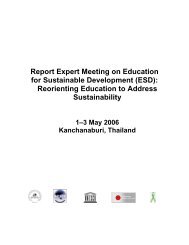Module 11 | Indigenous knowledge and sustainability - APCEIU
Module 11 | Indigenous knowledge and sustainability - APCEIU
Module 11 | Indigenous knowledge and sustainability - APCEIU
Create successful ePaper yourself
Turn your PDF publications into a flip-book with our unique Google optimized e-Paper software.
Q2: Complete the table for each principle. Parts of Principle 1 have been completed as an<br />
example.<br />
Principles Practical Examples Brief Definition<br />
Name the case study that<br />
best illustrates this<br />
principle in action<br />
1. Conservation<br />
Case Study:<br />
The Penan <strong>and</strong> Kedayan<br />
People of Brunei<br />
The Karen of Thail<strong>and</strong><br />
2. Appropriate<br />
Development<br />
Case Study:<br />
Give examples of what the<br />
people in the case study do<br />
to practise this principle.<br />
Write a brief definition of<br />
each principle in your own<br />
words<br />
Conservation means the wise<br />
use of natural resources;<br />
using only the resources you<br />
need <strong>and</strong> ensuring more will<br />
be than for other people in<br />
this <strong>and</strong> later generations.<br />
Appropriate development<br />
means:<br />
3. Democratic Participation<br />
Case Study:<br />
Democratic participation<br />
means:<br />
4. Social Equity & Peace<br />
Case Study:<br />
Social equity & peace<br />
means:<br />
Activity 4: <strong>Indigenous</strong> <strong>and</strong> formal education<br />
Q3: Explain some of the effects of colonialism on indigenous <strong>knowledge</strong><br />
Teaching <strong>and</strong> Learning for a Sustainable Future ©UNESCO 2001








